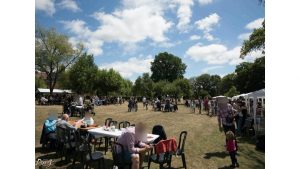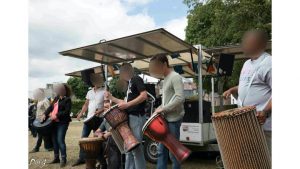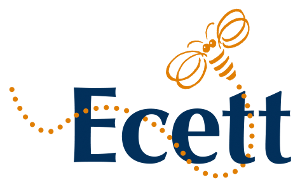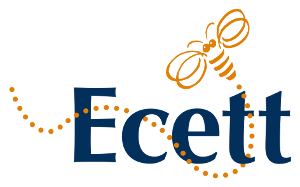By Florence Gratoir of the TC Trempoline (Belgium)
Every year, the residents organise a day of meeting with the families around a big barbecue. They take care of the reception and the meals for more than 250 people around large tables where families and residents mix. This is part of therapy.

Context
The Trempoline therapeutic programme is built on the Italian community model “Progetto Uomo”. 45 residents are welcomed for an 18-month programme, including 3 months in the Welcome phase, 9 months in the TC phase and 6 months in the social reintegration phase. Families are invited to participate in the treatment through Solidarity groups (mutual aid between parents), single and multi-family meetings, Saturday visits and family outings.
Findings
For some families it is not easy to come to the TC and talk to therapists. Families are usually ashamed of what has happened. Therapy is often surrounded by fear and misunderstanding for those who have never received it.
Beneficiaries of the barbecue day:
The Barbecue Day brings together about 250 people: all residents in treatment, their families, ex-residents and their families, staff and their families, volunteers, other special guests. The day brings together people of different ages: children, teenagers, adults, grandparents, etc.

General objective
To involve the residents’ families in the treatment. To strengthen the relationship between the family, the drug user and the institution and to reinforce the sense of coherence of the therapy. To give hope to the families. The annual family barbecue offers an excellent opportunity to start an informal relationship between family and staff, without the pressure of therapy. It is also an opportunity for the residents to sell their products, lasagna, jam, ice cream, etc. to finance their leisure time during the TC holidays.
How the day works
The barbecue day takes place on a Sunday in June at Trempoline. Families and other guests arrive at about 11am and the day ends at about 5pm. At the entrance they can buy tickets for food and drinks. Families bring desserts which will be sold.
The meal starts around 12.30. Participants move from table to table and to the buffet. Afterwards, residents lead dance performances, music, children’s activities, ponies, a bouncy castle, sell their lasagna and show their families around TC. There is enough free time for everyone to enjoy being together.
During this time, the therapists can get to know the residents’ family members. The family service team has the opportunity to meet the families of new residents and those who are not involved in their child’s treatment. By being able to talk to different therapists and residents, families gain a better understanding of the treatment in the TC. New families get to know other families, former residents and families of former residents. These exchanges show them that they are not alone and that their case is not unique. Staff from the whole institution can also come with their families and introduce themselves. This can be the first step to participate in the treatment, as trust has been established.
At the end of the day everyone attends the “graduation” ceremony for those who have completed the treatment at Trempoline. Parents and residents can see and hear those who are reintegrated into society and doing well. This is a reason for hope and support for the programme.

Impact
The family has the opportunity to experience TC for themselves and to better understand the TC method. They will also experience that there are other families/parents dealing with the same problem. Residents improve their relationship with their families. Staff build stronger relationships with families and will have better possibilities for future cooperation. All this strengthens the sense of community.
Staff competencies
Organisational and leadership skills – teamwork – communication – knowing how to talk informally to families (especially family therapists).
Human resources
Staff participation depending on the number of guests.
Logistics
Open air space if the weather is good; there should be a “dry” option if it rains. Tables, chairs, crockery, etc.
Risks to manage
Too few or too many participants. Parents might give money to their son/daughter without staff knowing, introduction of alcohol or drugs. Blues of some residents whose families are not present. Residents whose families will be away should be given responsibility. Others may decide to leave with their families.
Indicators
- The number of families coming to the barbecue and other annual events.
- The number of family visits in the Welcome and TC phases.
- the average number of family therapies per resident during the programme
- new parents at Solidarity groups
The Ecett Academy can help you to get in touch with the author of the GP, write to contact@ecett.eu.


